Laughing at the afflicted
Posted by Thersites on UTC 2020-03-18 08:14
A recent piece on the BBC News website introduced us to the 'climate doomers' in the UK.
The opinions these people express are insane. A taster:
"There are 9,000 people all over the world, so you can post on there in the middle of the night and get support. I post ideas about my compost bin and get lots of messages back with people being encouraging."
However, she thinks there will be a day when the electricity is cut off, so she is learning to recite poems by heart, in case she finds herself alone, with no internet or possessions.
"At least I'll have something to carry with me."
'Learning to recite poems by heart'. If you want more of this insanity you will have to go and read the article.
What caught our eye was the dissonance between ideas and lifestyle in the images that accompanied the piece. Rejecting technology and everything that makes life modern is one thing – doing without it, quite another thing.
Here is Rachel, digging for survival in her 'rewilded' garden.
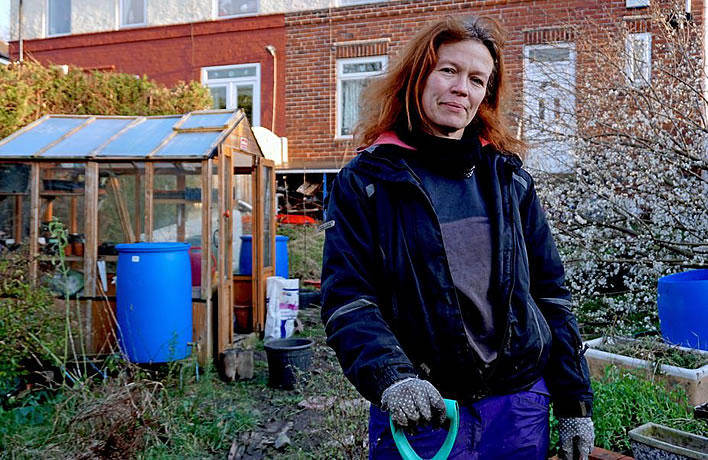
All images in this article are ©BBC, photographer Jack Hunter.
Fortunately, she is aided by plenty of modern technology: the four big, blue, plastic waterbutts; the greenhouse, a proud product of woodworkers and glass (perhaps even plastic?) manufacturers; plastic spade handle and shaft; black plastic buckets and trays; plastic compost bags; plastic window boxes. Her high-tech gardening gloves and clothes that clearly never came from sheep also catch our civilised eye.
Moderns should try looking at that photograph and the others here with the eyes of a medieval peasant, when all the modern wonders will be revealed. And then perhaps envisage the industrial landscape with its dark satanic mills on which the existence of all these modern artefacts is predicated.
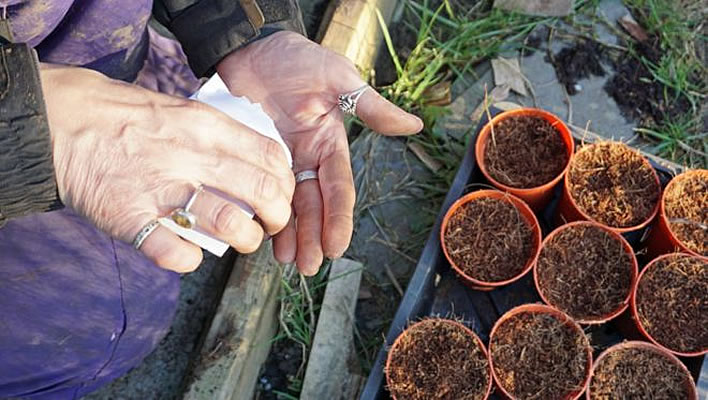
Putting in the seed – out of its hermetically sealed packing into those extremely practical plastic plant pots. Even the tray is plastic.
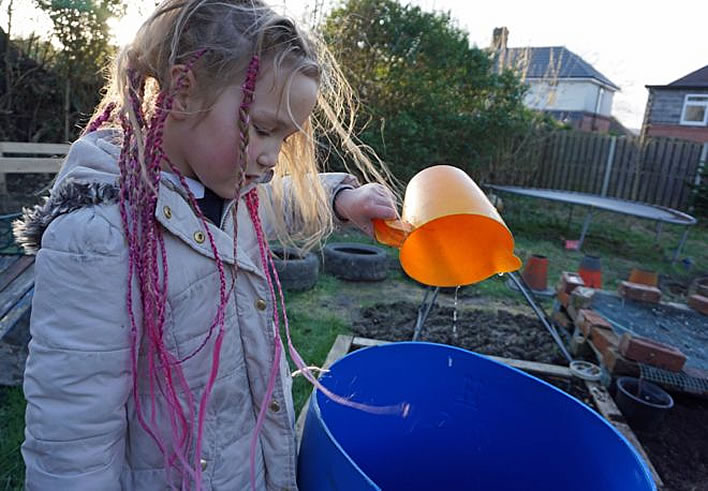
Here is one of her two daughters, who seems to be a plastic fan, too: the plastic jug, yet another plastic water butt, plastic buckets, two old tyres, bricks and even a trampoline (unsecured – tsk, tsk.). All the bright colours – even the girl's hair drools – courtesy of a flourishing chemical industry. More dark satanic mills.
There is more humour in some of the things we cannot see:
Every six weeks, she takes her two youngest daughters on an 450-mile round trip from their home in Sheffield to an organic farm in South Wales, where they learn how to forage for food. It's vital for them to learn "skills we'll be able to use in the natural world when all our systems have broken down," she says.
"I don't think what they're learning in school is the right stuff any more, given what we're facing. They need to be learning permaculture [self-sufficient agriculture] and other stuff, ancient stuff that we've forgotten how to do. We just go to Tesco."
'Ancient stuff', such as plastic water butts.
Let's not be cruel and ask difficult questions about the mode of transport they use for this weekly slog. Nor how the wasteland that is Rachel's 'rewilded' back garden is in any way 'self-sufficient'. Gardeners or allotment holders looking at these pictures will probably be appalled at this scruffy, unproductive mess.
'Ancient stuff' was the battle that mankind had to tame the 'wild' natural world and make it productive enough to support a domesticated population living off the land, as opposed to nomadic tribes living off nuts and berries – that is, exactly that foraging for food that the daughters are supposedly being taught. Civilisation began when humans stopped foraging and settled into agrarian communities.
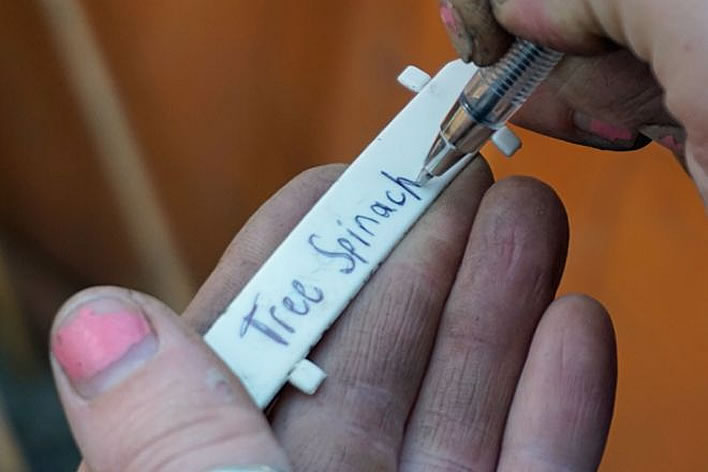
There was a time not so long ago when we used wooden seed labels. A soft pencil was used to write on them. Nowadays, only plastic and a high tech writing instrument will do.
Fortunately there is a flourishing chemical industry to produce brightly coloured nail lacquer, and a highly developed medical system with manufacturers of pharmaceuticals – more dark satanic mills – which can save Rachel from tetanus should she scratch those soiled hands.
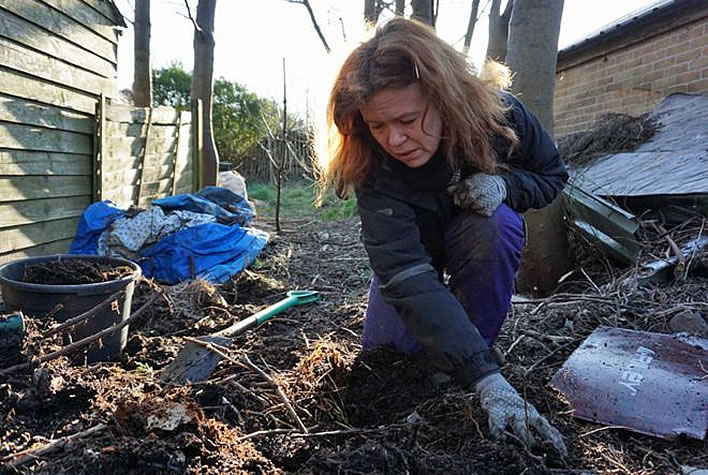
It's certainly a garden going wild. Quite how this wilderness will produce enough food to feed mother and daughters once society has collapsed is an open question. Fortunately, there is plenty of plastic and general civilisation junk around if needed.
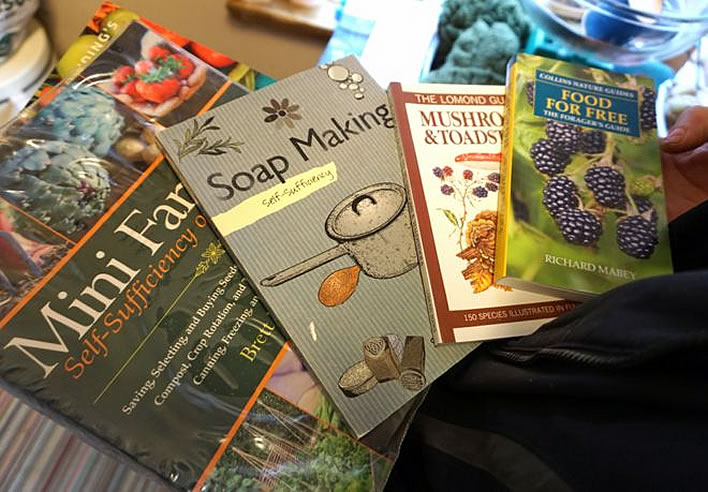
Here are some books from her shelves about foraging and self-sufficiency. It's a good thing that six-colour offset printing, bookbinding and lamination machines are there to help prepare us for civilisational collapse, not to mention digital colour photography, computer typesetting and so on and so forth.
For some, such as Rachel, "restoration" means rewilding their gardens and local neighbourhoods, learning foraging skills and imagining how to survive in a world without electricity.
The imagining doesn't seem to have got very far at the moment, but as long as there is plastic, we'll be OK.
But she's not at all confident her efforts will make much difference, in the long run. "I don't think we can save the human race," she says, "but hopefully we can leave the planet with some organic life."
And a lot of plastic water butts, don't forget.
0 Comments UTC Loaded:
Input rules for comments: No HTML, no images. Comments can be nested to a depth of eight. Surround a long quotation with curly braces: {blockquote}. Well-formed URLs will be rendered as links automatically. Do not click on links unless you are confident that they are safe. You have been warned!